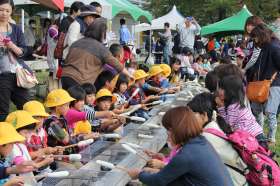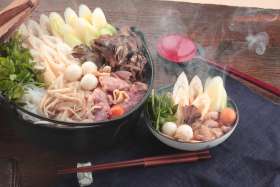Kiritanpo is a traditional winter specialty that is closely associated with the northern prefecture of Akita. It is prepared by smashing freshly-cooked rice and wrapping it around cedar skewers, then toasted over an open hearth called an irori. Its origin dates back to when hunters would take their leftover rice, pound it into a pulp, wrap it onto wooden skewers, and grill it over their open camp fires when they were deep in the forest.


Today, it is more common to grill kiritanpo indoors over a specialised irori, a classic Japanese-style sunken hearth still found in the most traditional homes and many rustic restaurants. While kiritanpo is usually prepared by coating it in savoury-sweet miso paste and grilling it over an open fire, it can also be prepared as a hearty kiritanpo nabe, a traditional Akita hotpot dish that features kiritanpo as rice dumplings, stewed together with Hinai chicken (a local breed), burdock, green onions, and parsley in a soy-based broth. The dish can be found all over Akita prefecture, but truly authentic kiritanpo nabe can be found in Odate where kiritanpo was created.


One of the best places to experience authentic Akita kiritanpo in its most traditional way is to head to Semboku which is famous for its local sites like Lake Tazawa, Nyuto Hot Spring Village, and Kakunodate Samurai Residences. Its rural regions are dotted with traditional inns and farm stays where you can even experience making your own kiritanpo – prepared with premium Akita-komachi rice (which is stickier and lighter in taste than many other varieties of rice), by learning how to pound and skewer the mashed rice on sticks of Akita cedar, and then grill it over the fire in a traditional irori hearth.
To discover more about rural life in Akita and kiritanpo-making, visit Semboku City’s Website
















































